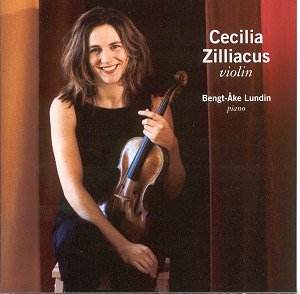As a showcase for the young violinist Cecilia Zilliacus’s
talents, this CD fulfils its remit more than adequately. The programming
is inspired, the two sonatas complementing each other perfectly. Apparently
Zilliacus made her UK debut in October 2001, with the BBC National Orchestra
of Wales under Petri Sakari. On the basis of this disc, it is to be
hoped that she returns to these shores often.
How interesting it is to have these two prominent 20th-century
Hungarians shoulder to shoulder. Perhaps the Dohnányi is the
more approachable piece of the two. Stig Jacobsson’s notes refer to
this composer as ‘the missing link between Romanticism and Modernism’,
and that comment holds true for the First Violin Sonata. It is performed
with the fire and enthusiasm of youth here. The wistful opening sets
the tone. Zilliacus is capable of a very affecting half-tone and can
be touching when required (end of the first movement, for example).
The dancing, echt-Hungarian finale, Vivace assai, comes across
with great energy (the contrasting lyrical theme has the effect of a
musical ‘stretch’!). Both players rise to the virtuoso demands triumphantly.
Lundin copes with Dohnányi’s difficult part with aplomb. The
competition is not great in the catalogue: Tasmin Little and Martin
Roscoe on ASV and an historic account by Oscar Shumsky on Biddulph offer
the greatest threats, but Zilliacus and Lundin provide a perfectly convincing
case for the piece. You will not be disappointed by them.
There is much more rivalry for the Bartók, however.
David Oistrakh, Kremer and Stern all make their presence felt, plus
there is an excellent and probably more directly comparable recording
from Isabelle Faust on Harmonia Mundi. Despite this, Zilliacus acquits
herself well, and Lundin seems to relish the opportunity to flex his
pianistic muscles. Technically, Zilliacus is amazing, whether in the
fast passages, when spinning a high-lying line or while setting the
pulse racing in the finale with Lundin hardly less impressive here.
There is real concentration in the second movement extended solo violin,
not to mention real control, and it is this movement that is the crowning
point of this rewarding disc. The finale is hardly less impressive,
dripping with confidence from both players. The race to the end is guaranteed
to set your pulse racing.
A triumph all round, then. The recording is exemplary:
clear, clean yet atmospheric. Strongly recommended.
Colin Clarke

